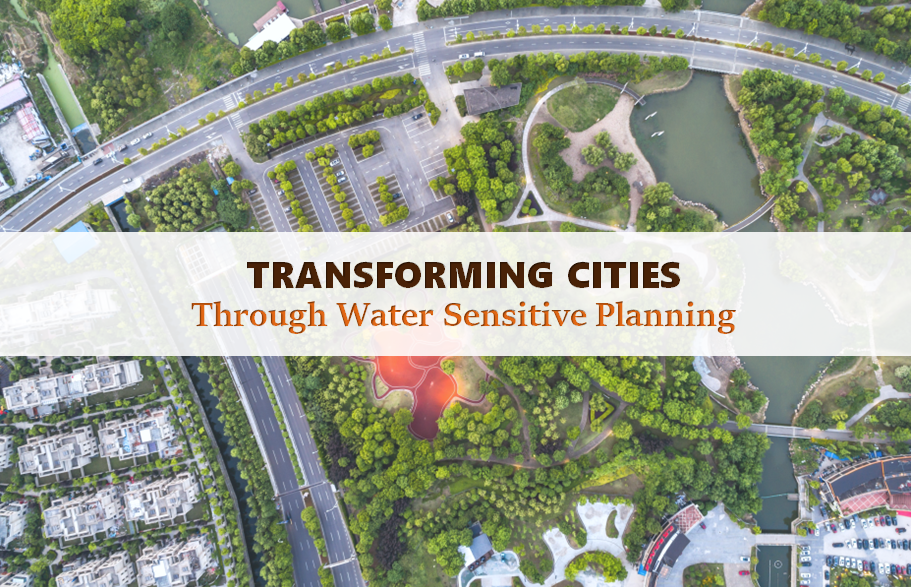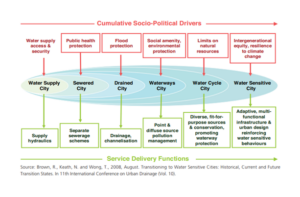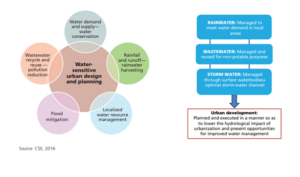Home » Transforming Cities Through Water Sensitive Planning

Conditions for urban water systems are radically changing. Current water concerns, such as flooding and water shortages, are made worse by the effects of climate change, increased urbanization, and failing and antiquated infrastructure. Shortages and rehabilitation expenses that will be too high for cities to handle. According to the World Resource Institute’s 2013 worldwide water-stress rankings, India has a high level of water stress due to its 40–80% extraction to supply ratio. Over the past few decades, India has seen a sharp rise in the population living in cities. The current issue that plagues all towns and cities is the widening gap between the supply and demand for water, which puts strain on the availability of water resources.
To meet the irregular water supply needs, people either drill wells and tube wells on their properties or purchase water from private tankers that extract groundwater for commercial purposes. In addition, water sources are few, heavily contaminated, and subsidized for home use. There is no set price or criteria for extracting groundwater.
Read More : Improved Solid Waste Management in Smart Cities
The need for ecologically friendly alternatives is rising due to the widening gap between supply and demand as well as the worsening environmental conditions. To lessen our ecological footprint, it is critical to take on the issue of managing and wisely exploiting natural resources. Prudent use of water resources combined with a comprehensive approach to sustainability are necessary for sustainable water management.
 Figure 1: Urban water management transition framework
Figure 1: Urban water management transition framework
The current state of affairs makes it abundantly evident that careful planning and a reorientation of priorities are needed to achieve sustainable water management. Including water sensitivity in the planning and design stages of both new and existing developments can help to preserve the water cycle by controlling the amount of water available, storm water runoff, wastewater, and groundwater. It can also have positive effects on climate change adaptation by lowering temperatures.
Water Sensitive Planning is a strategy that, by include the following in planning and developing, integrates and maximizes the use of available water sources and completes the water cycle. Strategies include:

Figure 2: Integrating water-cycle management
Ar. Aditi Arora
HOD
School of Architecture and Planning
Lingaya’s Vidyapeeth
Colleges For Architecture In Delhi NCR
Lingaya’s Vidyapeeth is renowned as the top private university that leading architecture college for B.Arch, B.Plan, and M.Plan Courses. With a blend of innovative curriculum, expert faculty, and cutting-edge facilities, it fosters creativity and excellence in architectural education. The college’s focus on practical learning ensures students are well-prepared for rewarding careers in architecture and planning.
March 1, 2024
RECENT POSTS
CATEGORIES
TAGS
Agriculture Agriculture future AI Architecture artificial intelligence BA English BA Psychology BTech CSE BTech Engineering Business management career Career-Specific Education career guide Career Opportunities career option career scope Civil engineering commerce and management Computer Science Computer science engineering Data science degree education Engineering Engineering students English Literature english program Exam tips Fashion Design Fashion design course Higher Education Journalism journalism and mass communication law Law career Machine Learning MA Psychology Master degree mathematics MBA Mechanical Engineering Pharmacy Psychology Research and Development students
University Address: Nachauli, Jasana Road, Faridabad, Haryana
Toll Free: 1800-120-4613
Mobile : 8447744303 | 8447744304 | 8447744306 | 8447744309
Address: C-72, Second Floor, Shivalik, Near Malviya Nagar,
Above HDFC Bank, New Delhi 110017
Ph.No. - 011-46570515 / 45138169 / 41755703 / +91-7303152412
Jagmani Kutir, Ground Floor, Road No-1, Rajeev Nagar,
Near Darbar Marriage Hall, Patna-800024, Bihar
Contact No: 9818352069/8130120095
Mail: [email protected]
Copyrights © 1998 - 2025 Lingaya's Vidyapeeth (Deemed To Be University). All rights reserved.
It is important to note that the following email IDs and domains are fraudulent and do not belong to our university.
LV only conducts physical/online verification of any document related to examination on the following email id: